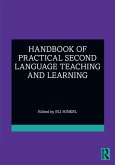Cognitive Task Complexity and Second Language Performance
Understanding L2 Learner Affect and Engagement
Herausgeber: Johnson, Mark D.; Tabari, Mahmoud Abdi
Cognitive Task Complexity and Second Language Performance
Understanding L2 Learner Affect and Engagement
Herausgeber: Johnson, Mark D.; Tabari, Mahmoud Abdi
- Broschiertes Buch
- Merkliste
- Auf die Merkliste
- Bewerten Bewerten
- Teilen
- Produkt teilen
- Produkterinnerung
- Produkterinnerung
The edited volume brings together renowned scholars in the field who present data-driven insights into the intricate relationships between CTC and L2 performance, drawing on a combination of empirical studies and theoretical analyses.
Andere Kunden interessierten sich auch für
![Teaching ESL/EFL Listening and Speaking Teaching ESL/EFL Listening and Speaking]() Jonathan M. NewtonTeaching ESL/EFL Listening and Speaking45,99 €
Jonathan M. NewtonTeaching ESL/EFL Listening and Speaking45,99 €![Teaching and Learning Second Language Listening Teaching and Learning Second Language Listening]() Christine C. M. GohTeaching and Learning Second Language Listening45,99 €
Christine C. M. GohTeaching and Learning Second Language Listening45,99 €![Handbook of Practical Second Language Teaching and Learning Handbook of Practical Second Language Teaching and Learning]() Handbook of Practical Second Language Teaching and Learning145,99 €
Handbook of Practical Second Language Teaching and Learning145,99 €![Practical Grammar Teaching for the Second Language Classroom Practical Grammar Teaching for the Second Language Classroom]() Practical Grammar Teaching for the Second Language Classroom58,99 €
Practical Grammar Teaching for the Second Language Classroom58,99 €![English Phonetics, Phonology and Spelling for the English Language Teacher English Phonetics, Phonology and Spelling for the English Language Teacher]() Laurie BauerEnglish Phonetics, Phonology and Spelling for the English Language Teacher45,99 €
Laurie BauerEnglish Phonetics, Phonology and Spelling for the English Language Teacher45,99 €![English Phonetics, Phonology and Spelling for the English Language Teacher English Phonetics, Phonology and Spelling for the English Language Teacher]() Laurie BauerEnglish Phonetics, Phonology and Spelling for the English Language Teacher154,99 €
Laurie BauerEnglish Phonetics, Phonology and Spelling for the English Language Teacher154,99 €![Foundational Principles of Task-Based Language Teaching Foundational Principles of Task-Based Language Teaching]() Martin EastFoundational Principles of Task-Based Language Teaching43,99 €
Martin EastFoundational Principles of Task-Based Language Teaching43,99 €-
-
-
The edited volume brings together renowned scholars in the field who present data-driven insights into the intricate relationships between CTC and L2 performance, drawing on a combination of empirical studies and theoretical analyses.
Produktdetails
- Produktdetails
- ESL & Applied Linguistics Professional Series
- Verlag: Taylor & Francis Ltd
- Seitenzahl: 276
- Erscheinungstermin: 23. Juni 2025
- Englisch
- Abmessung: 229mm x 152mm x 15mm
- Gewicht: 404g
- ISBN-13: 9781032815145
- ISBN-10: 1032815140
- Artikelnr.: 72701323
- Herstellerkennzeichnung
- Libri GmbH
- Europaallee 1
- 36244 Bad Hersfeld
- gpsr@libri.de
- ESL & Applied Linguistics Professional Series
- Verlag: Taylor & Francis Ltd
- Seitenzahl: 276
- Erscheinungstermin: 23. Juni 2025
- Englisch
- Abmessung: 229mm x 152mm x 15mm
- Gewicht: 404g
- ISBN-13: 9781032815145
- ISBN-10: 1032815140
- Artikelnr.: 72701323
- Herstellerkennzeichnung
- Libri GmbH
- Europaallee 1
- 36244 Bad Hersfeld
- gpsr@libri.de
Mark D. Johnson is Associate Professor of TESOL and Applied Linguistics in the Department of English at East Carolina University, where he teaches linguistics and TESOL classes. His research focuses on cognition in second language writing. Mahmoud Abdi Tabari is Teaching Assistant Professor of TESOL and Writing Studies in the Department of English at the University of Nevada, Reno (UNR). His research focuses on second language acquisition, second language writing, and task-based language teaching.
Contents
Part I: Background: CTC and the Skills
Chapter 1: A Brief History of Cognition in L2 Performance
Mark D. Johnson and Mahmoud Abdi Tabari
Chapter 2: The Role of Task Complexity in Speech Production and Dialogue
Models
Ana-María Nuevo
Chapter 3: A Methodological Review of the Research on Task Complexity in
Second Language Oral Production
Hao Lin and Shaofeng Li
Chapter 4: New Insights: Modeling Second Language Writing Integrating
Cognitive Task Complexity
Ting Sophia Xu and Lawrence Jun Zhang
Chapter 5: Writing: Critical Issues
Jookyoung Jung and Honglan Wang
Part II: CTC and the Learner
Chapter 6: Learner Engagement: Theoretical Perspectives
Daniel O. Jackson
Chapter 7: Learner Engagement: Critical Issues
Ágnes Albert
Chapter 8: Emotions and Task Complexity: Proposing a Theoretical Framework
and Setting a Research Agenda
Chengchen Li
Part III: CTC and Technology
Chapter 9: Virtual Interaction
Nicole Ziegler and Ayano Kawasaki
Chapter 10: Task Complexity and Collaborative Writing in a Virtual
Environment
Meixiu Zhang
Chapter 11: Corpus Linguistics
Yuanheng (Arthur) Wang and Xiaofei Lu
Part IV: Future Directions and Conclusion
Chapter 12: Future Directions: A Methodological Synthesis of Cognitive Task
Complexity Research
Rebecca Adams
Chapter 13: Conclusion: Cognitive Task Complexity-Past, Present, and Future
Mahmoud Abdi Tabari and Mark D. Johnson
Part I: Background: CTC and the Skills
Chapter 1: A Brief History of Cognition in L2 Performance
Mark D. Johnson and Mahmoud Abdi Tabari
Chapter 2: The Role of Task Complexity in Speech Production and Dialogue
Models
Ana-María Nuevo
Chapter 3: A Methodological Review of the Research on Task Complexity in
Second Language Oral Production
Hao Lin and Shaofeng Li
Chapter 4: New Insights: Modeling Second Language Writing Integrating
Cognitive Task Complexity
Ting Sophia Xu and Lawrence Jun Zhang
Chapter 5: Writing: Critical Issues
Jookyoung Jung and Honglan Wang
Part II: CTC and the Learner
Chapter 6: Learner Engagement: Theoretical Perspectives
Daniel O. Jackson
Chapter 7: Learner Engagement: Critical Issues
Ágnes Albert
Chapter 8: Emotions and Task Complexity: Proposing a Theoretical Framework
and Setting a Research Agenda
Chengchen Li
Part III: CTC and Technology
Chapter 9: Virtual Interaction
Nicole Ziegler and Ayano Kawasaki
Chapter 10: Task Complexity and Collaborative Writing in a Virtual
Environment
Meixiu Zhang
Chapter 11: Corpus Linguistics
Yuanheng (Arthur) Wang and Xiaofei Lu
Part IV: Future Directions and Conclusion
Chapter 12: Future Directions: A Methodological Synthesis of Cognitive Task
Complexity Research
Rebecca Adams
Chapter 13: Conclusion: Cognitive Task Complexity-Past, Present, and Future
Mahmoud Abdi Tabari and Mark D. Johnson
Contents
Part I: Background: CTC and the Skills
Chapter 1: A Brief History of Cognition in L2 Performance
Mark D. Johnson and Mahmoud Abdi Tabari
Chapter 2: The Role of Task Complexity in Speech Production and Dialogue
Models
Ana-María Nuevo
Chapter 3: A Methodological Review of the Research on Task Complexity in
Second Language Oral Production
Hao Lin and Shaofeng Li
Chapter 4: New Insights: Modeling Second Language Writing Integrating
Cognitive Task Complexity
Ting Sophia Xu and Lawrence Jun Zhang
Chapter 5: Writing: Critical Issues
Jookyoung Jung and Honglan Wang
Part II: CTC and the Learner
Chapter 6: Learner Engagement: Theoretical Perspectives
Daniel O. Jackson
Chapter 7: Learner Engagement: Critical Issues
Ágnes Albert
Chapter 8: Emotions and Task Complexity: Proposing a Theoretical Framework
and Setting a Research Agenda
Chengchen Li
Part III: CTC and Technology
Chapter 9: Virtual Interaction
Nicole Ziegler and Ayano Kawasaki
Chapter 10: Task Complexity and Collaborative Writing in a Virtual
Environment
Meixiu Zhang
Chapter 11: Corpus Linguistics
Yuanheng (Arthur) Wang and Xiaofei Lu
Part IV: Future Directions and Conclusion
Chapter 12: Future Directions: A Methodological Synthesis of Cognitive Task
Complexity Research
Rebecca Adams
Chapter 13: Conclusion: Cognitive Task Complexity-Past, Present, and Future
Mahmoud Abdi Tabari and Mark D. Johnson
Part I: Background: CTC and the Skills
Chapter 1: A Brief History of Cognition in L2 Performance
Mark D. Johnson and Mahmoud Abdi Tabari
Chapter 2: The Role of Task Complexity in Speech Production and Dialogue
Models
Ana-María Nuevo
Chapter 3: A Methodological Review of the Research on Task Complexity in
Second Language Oral Production
Hao Lin and Shaofeng Li
Chapter 4: New Insights: Modeling Second Language Writing Integrating
Cognitive Task Complexity
Ting Sophia Xu and Lawrence Jun Zhang
Chapter 5: Writing: Critical Issues
Jookyoung Jung and Honglan Wang
Part II: CTC and the Learner
Chapter 6: Learner Engagement: Theoretical Perspectives
Daniel O. Jackson
Chapter 7: Learner Engagement: Critical Issues
Ágnes Albert
Chapter 8: Emotions and Task Complexity: Proposing a Theoretical Framework
and Setting a Research Agenda
Chengchen Li
Part III: CTC and Technology
Chapter 9: Virtual Interaction
Nicole Ziegler and Ayano Kawasaki
Chapter 10: Task Complexity and Collaborative Writing in a Virtual
Environment
Meixiu Zhang
Chapter 11: Corpus Linguistics
Yuanheng (Arthur) Wang and Xiaofei Lu
Part IV: Future Directions and Conclusion
Chapter 12: Future Directions: A Methodological Synthesis of Cognitive Task
Complexity Research
Rebecca Adams
Chapter 13: Conclusion: Cognitive Task Complexity-Past, Present, and Future
Mahmoud Abdi Tabari and Mark D. Johnson








